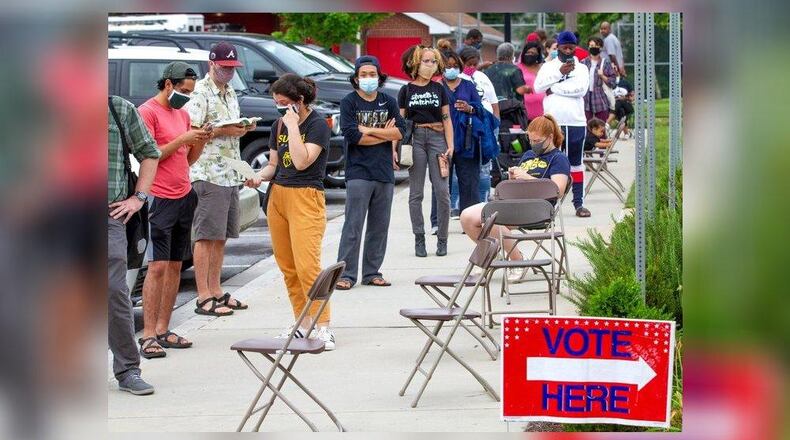The State Election Board on Wednesday extended two temporary rules that will make it easier to process large numbers of absentee ballots for November’s general election.
The first rule will allow local election officials to continue to provide drop boxes for absentee ballots — instead of requiring voters to mail the ballots or deliver them to election offices by hand. The second will allow election officials to process — but not tally — those ballots before election day.
The board adopted both rules on a temporary basis leading up to the June 9 primary election. Wednesday’s vote extended the emergency measures for an additional six months, and the board is expected to make them permanent before November.
The move is a sign that absentee ballots are likely to play a substantial role in Georgia elections moving forward — at least during the coronavirus pandemic. It's also the latest sign the state is trying to salvage what lessons it can from the June 9 election fiasco that drew national condemnation.
“We want to let Georgians know that we are all going to work together to make the elections in August, November and January a success,” Secretary of State Brad Raffensperger told the election board.
Problems during the primary election included equipment difficulties at polling places, a shortage of poll workers and inadequate training for the state’s complicated new voting system. As a result, many voters waited for hours to cast their ballots.
Finger-pointing ensued, with Raffensperger blaming local officials — especially in Fulton and DeKalb counties — and the locals accusing the secretary of state of abdicating his responsibilities. All have vowed to do what they can to prevent another debacle during the November general election.
Efforts to encourage early and absentee voting are likely to be a big part of the solution.
On Monday, Fulton County approved State Farm Arena as an early voting site. The mammoth site could accommodate many more voters than a typical precinct and still allow for social distancing.
Wednesday’s decision by the State Election Board will make it easier to accommodate absentee ballots.
The first rule allows — but does not require — local officials to provide drop boxes to collect absentee ballots. The second allows them to open and process ballots before election day to manage the influx of paper, but it prohibits them from tabulating the ballots until the polls have closed.
The state has long allowed voters to cast an absentee ballot for any reason. But it stepped up efforts to encourage absentee voting amid the pandemic, and voters responded. More than half of voters who participated in the primary, over 1.1 million, submitted absentee ballots.
For that election, the secretary of state's office mailed absentee voting applications to the state's 6.9 million active voters. Raffensperger has already ruled that out for the November election, saying it would be impractical and too costly to repeat the move, which cost an estimated $5 million. Instead, he plans to create a website where voters can request absentee ballots on their own.
On Wednesday, board members differed on whether that’s a good idea. David Worley, a Democrat, urged Raffensperger to mail applications to every voter again because pandemic conditions continue.
“If we don’t have a very robust absentee ballot program, we will see an absolute disaster at the polls in November,” Worley said.
Matt Mashburn, an appointee of the Republican-controlled state Senate, sided with the secretary of state. He wants to encourage absentee voting, but without the cost of mailing the applications.
“We paid for postage for 6 million people who didn’t want to use absentee ballots (in June),” Mashburn said. “We didn’t know that then. But we know it now.”
Raffensperger told the board the November election will be challenging, with turnout expected to be three times that of the June primary. He said he wants to “put the weaponization of election administration of both the left and the right behind us.”
About the Author
Keep Reading
The Latest
Featured




